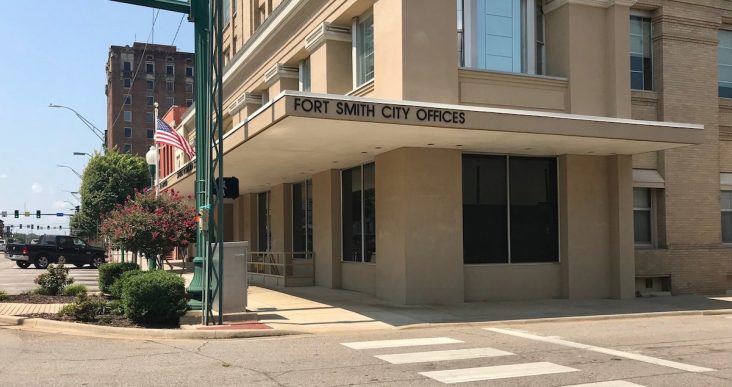Fort Smith Board raises alcohol tax, waste hauler fee to generate more city revenue
by December 17, 2020 11:34 am 1,351 views

The Fort Smith Board of Directors on Tuesday (Dec. 15) approved an alcohol tax increase and a higher fee on commercial solid waste haulers to generate an estimated $700,000 in new annual revenue for the city.
The board approved, six in favor and one opposed, an ordinance charging an annual franchise fee equivalent to 5% of gross revenues collected in the city for service provided by commercial solid waste haulers in the city. Director Neal Martin voted against the fee. The fee is expected to bring in between $100,000 and $200,000 a year, said Andy Richards, finance director for the city.
The board also approved an ordinance that will raise the supplemental alcohol tax on private clubs. Private clubs are already charged a 5% tax on alcohol sold in the club. This is on top of the 9.75% sales tax in the city. The ordinance will raise that to 10%. Because of an amendment, the tax is set to go into effect Dec. 1, 2021. The original ordinance to collect a supplemental alcohol tax was enacted in 1969. The increase in the alcohol sales tax is expected to raise about $500,000 annually, Richards said. The current 5% supplemental tax typically brings in $525,000 in annual revenue.
The ordinance passed with a vote of five for and two against. Directors George Catsavis and Martin voted against the tax, saying it was going to burden the citizens of Fort Smith because private club owners would pass the tax along to the citizens.
Talicia Richardson, executive director of 64.6 Downtown and owner of a downtown Fort Smith bar, addressed the board prior to the vote to ask them to put off consideration of the tax until December 2021.
“Director (Kevin) Settle you just stated something I just find fascinating … that you never thought (nine months ago) the city would be in the position it is in today. Unfortunately, there are many small businesses that cannot say the same. There are small businesses in our community that have closed their doors. There are small businesses that are trying to sustain. … They are not in the position of having finances to sustain them,” Richardson said.
She said the tax would come on the heels of bars and restaurants having to close in-person dining for 74 days in the spring due to state mandates during the COVID-19 pandemic and still only be open to limited capacity and shortened hours. Even though a vaccine has been approved, there is no certainty the pandemic and its related restrictions will end soon, and the impact of the tax on private club owners will be extreme, Richardson said. Martin agreed.
“Just because we can (raise this tax) does not mean we should,” he said.
Martin, earlier in the meeting, applauded the city’s ability to end the year with a $4.7 million surplus in the budget thanks to budget cuts and a hiring freeze in anticipation of lower sales tax revenue during the pandemic.
When the pandemic first hit in March, predictions for sales tax revenue was that it would take a dive, not continue to surpass last year’s revenues. In April, City Administrator Carl Geffken told city directors that sales tax revenues for April and May were expected to be 20% of what the city would normally collect due to the COVID-19 pandemic and ensuing state-regulated closures of restaurants, bars and other business. Collections in June and July were expected to be 50% of what the city would normally collect, he said. In total, Geffken estimated a 22% reduction in city sales tax revenue because of the COVID-19 pandemic. To prepare for the reductions, city departments were asked to trim 10% from each of their budgets.
Revenues generated by the city’s portion of the Sebastian County 1% tax generated $15.1 million during the first 10 months of 2020, up 5.3% from 2019 and up 5.2% from the budget estimate. Year-to-date revenue from the 1% city street tax totaled $18.77 million through October, up 3.7% compared to the same period in 2020 and up 4.05% over the budget estimate – $866,144 – for the first 10 months of the year, according to the city’s October sales tax report.
“I think the citizens have seen the city has been fiscally responsible in 2020 and 2019 (which also ended the year with surplus revenue)” Martin said. Now, instead of raising a tax or implementing a franchise fee, the city should continue to be responsible and live within its means, Martin said.
The board agreed to put the alcohol tax on the agenda for a future study session and see if the ordinance needs to be repealed prior to Dec. 1 because of circumstances surrounding the COVID pandemic.
In other business, the board agreed to continue funding a call center for the utilities department through March with a total cost of $83,000. Though there was some discussion on the need to continue the “temporary” call center that was set up in March 2019, directors agreed it benefitted both the utilities and solid waste services departments and the city as a whole by providing better customer service. Settle said he would like to see a proposal on how to continue customer service in a more streamlined way before March.
